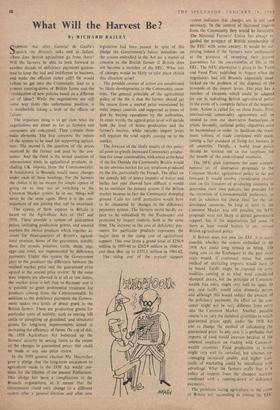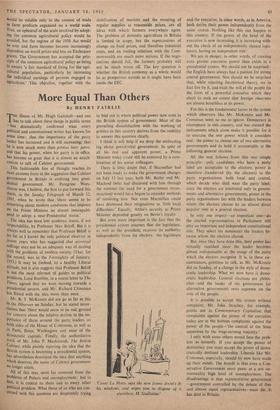What Will the Harvest Be?
By RICHARD BAILEY
SurPosE that after General de Gaulle's speech the Brussels talks end in failure, where does British agriculture go from there? Will the farmers be able to look forward to another decade of deficiency payments guaran- teed to keep the bad and indifferent in business, and make the efficient richer still? Or would failure to get into the Community lead to a general running-down of British farms and the Introduction of new policies based on a different set of ideas? While the negotiations are still some way from this unfortunate position, it
worthwhile taking a look at the effects of failure.
The important thing is to get clear what the negotiations are about so far as farmers and consumers are concerned. They contain three main elements. The first concerns the nature of the system to be used for supporting agricul- ture. The second is the question of the prices received by the farmer and paid by the con- sumer. And the third is the broad question of international trade in agricultural products, in- cluding UK imports from the Commonwealth. A breakdown in Brussels would mean changes under each of these headings. For the farmers the choice is by no means the simple option of going on as they are or switching to the Common Market system. In or out, things will neverebe the same again. Here it is the con- sequences of not joining that will be examined.
The system of farm support in Britain is based on the Agriculture Acts of 1947 and 1958. These provide a system of guaranteed prices, including production grants, and assured markets for twelve products which together ac- count for three-quarters of Britain's agricul- tural produce. Some of the guarantees, notably those for cereals, potatoes, cattle, sheep, pigs, eggs and wool, are implemented by deficiency, payments. Under this system the Government pays to the producer the difference between the realised market price and the guaranteed price agreed at the annual price review. At the same time imports are allowed in at nil or low duties, the market price is left free to fluctuate and it is possible to grant preferential treatment for products coming from the Commonwealth. In addition to the deficiency payments the Govern- ment makes two kinds of direct grant to the British farmer. '1 hese are production grants for
particular sorts of activity, such as rearing hill cattle or ploughing up grassland, and structural grants for long-term improvements aimed at increasing the efficiency of farms. On top of this, the 1958 Agriculture Act bolstered up the farmers' security by setting limits to the extent of the changes in guaranteed prices that could be made at any one price review.
In the 1959 general election Mr. Macmillan gave a pledge that the long-term assurances to agriculture made in the 1958 Act would con- tinue for the lifetime of the present Parliament. This pledge has been a complication in the Brussels negotiations, as it means that the Government could only change to a different system after a general election and after new legislation had been passed. In spite of this pledge the Government's future intentions on the system embodied in the Act are a matter of concern to the British farmer if Britain does not become a member of the EEC. What sort of changes would be likely to take place should this situation arise?
The possible courses of action are conditioned by likely developments in the Community coun- tries. The general principle of the agricultural policy of the Six is that the farmer should get his return from a market price maintained by strict import controls and supported at times of glut by buying operations by the authorities. In other words, the agreed price level will decide both the level of home production and the farmer's income, while variable import levies wilt regulate the total supply coming on to the market. •
The forecast of the likely results of this policy all point to greatly increased Community produc- tion for some commodities, with wheat at the head of the list. Outside the Community Britain would be the obvious market for any surpluses produced by the Six, particularly the French. The effect on the subsidy bill of heavy imports of butter and barley last year showed how difficult it would be to maintain the present system if the British market became in fact the Community dumping ground. Calls for tariff protection would have to be countered by changes in the deficiency payments system. The farmers could hardly ex- pect to be subsidised by the Exchequer and protected by import controls both at the same time. The increase in the cost of deficiency pay- ments for particular products represents the major item in the rising cost of agricultural support. This rose from a grand total of £256.9 million in 1959-60 to £262.9 million in 1960-6/, and then shot up to £351.1 million in 1961-62.
The rising cost of the present support system indicates that changes are in any case necessary. 7n the context of increased imports from the Community they would be inevitable.
The National Farmers' Union has always re- garded the prospect of British membership of the EEC with some anxiety. It would be sur- prising indeed if the farmers were enthusiastic at the prospect of swapping their present guarantees for the uncertainties of life in the EEC. The NFU alternative is given in the 'Farm and Food Plan' published in August when the negotiators had left Brussels apparently dead- locked on the problem of the disposal of the proceeds of the import levies, The plan has a number of elements which could be adapted for use in redrafting British agricultural policy in the event of ta complete failure of the negotia- tions. Action is called for on three fronts. First,
international . commodity agreements will be needed to iron out short-term fluctuations in prices. Secondly, national policy objectives must be harmonised ,in order to facilitate the maxi- • mum volume of trade consistent with main- taining a fair standard of living for farmers in
all countries.' Thirdly, a world food policy should be worked out to use surpluses for the benefit of the undeveloped countries.
The NFU plan represents the most compre- hensive set of alternative proposals to the
CoMmon Market agricultural policy so far put forward. It would involve considerable restric- tion on the freedom of producing countries to determine their own policies, but provides for the retention of Commonwealth preference, as well as schernes for cheap food for the un- developed countries. So long as entry to the
Common Market was still possible, the NFU proposals were not likely- to attract government
support, but if the negotiations fail some of them at least would feature in any re' ihsd British agricultural policy.
If Britain does not join the EEC it is ques- tionable whether the system embodied in the 1958- Act could long remain in being. 1 he
rising cost to the Exchequer in the past three years would, if continued, mean that some method of restricting imports would have to he found. Tariffs might be imposed on com- modities corning in at what were -considered
`dumped' prices, but the -principle of Common- wealth free entry might very well be upset. In any case tariffs would raise domestic prices, and although this would reduce the amount of
the deficiency payments, the effect on the con-
sumer might not be very different from entry into the Common Market. Another possible course is to vary the standard quantities to which
-guaranteed prices apply under the 1958 Act and to change the method of calculating the guaranteed price. In any case it is probable that imports of food would increase because of the renewed emphasis on trading with Common- wealth countries. Food production at home might very well be curtailed, but schemes en- couraging increased quality and higher stan- dards of marketing could be introduced with advantage. ‘Vhat the farmers really fear is a policy of imports from the cheapest markets combined with a running-down of deficiency payments.
The problems facing agriculture in the event • of Britain not succeeding in joining the EEC
would be soluble only in the context of trade in farm products organised on a world scale. True, an upheaval of the scale involved by adopt- ing the common agricultural policy would be avoided, but the regime of the 1958 Act would be over and farm incomes become increasingly dependent on world prices and less on Exchequer grants, The Government has accepted the prin- ciple of the common agricultural policy as being to ensure 'a fair standard of living for the agri- cultural population, particularly by increasing the individual earnings of persons engaged in agriculture.' This objective, together with the stabilisation of markets and the ensuring of regular supplies at reasonable prices, are all ideas with which farmers everywhere agree. The problem of domestic agriculture in Britain is limited in scope, but the repercussions of change on food prices, and therefore industrial costs, and on trading relations with the Corn- irinwealth are much more serious. If the nego- tiations should fail, the farmers probably will not be much worse off. The key question is whether the British economy as a whole would be as prosperous outside as it might have been inside the EEC.































 Previous page
Previous page